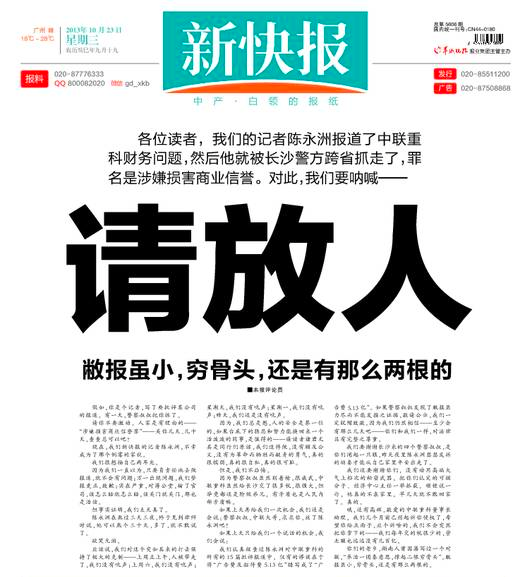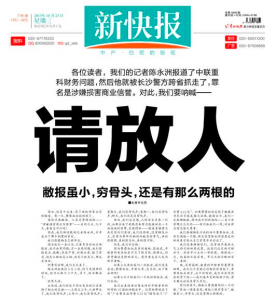China Media Project’s David Bandurski translates a front-page editorial from Guangdong’s New Express, pleading for the release of reporter Chen Yongzhou. Chen was detained last week by Changsha police operating outside their jurisdiction for “damaging the business reputation” of construction machinery manufacturer Zoomlion. The editorial appeared on Wednesday under the oversized headline, “PLEASE RELEASE HIM”.
[… W]e have always believed that if we just go out and responsibly do our reporting, there won’t be any problem; and if by chance there are problems, we can print corrections in the newspaper, and apologise [for our errors]. And if things are really serious, we prepare for the courtroom — and if we lose, we pay compensation as it’s demanded. If [given such eventualities] we must close our doors, well then, that’s only what we deserve.
But the facts show that we have been too naive.
[…] We have diligently studied all 15 of the reports Chen Yongzhou wrote about Zoomlion, but could only find that we mistakenly wrote what should have been “advertising and entertainment fees of 513 million” as “advertising fees of 513 million.” If Brother Policeman can find any evidence of shabby reporting on our part, please make notice of it and we will gladly doff our hat. Because we still believe that — some day, at least — you will have the same full respect for the law that we have. [Source]
Another New Express reporter Liu Hu was formally arrested on defamation charges last month after alleging “serious misconduct” by Chongqing official Ma Zhengqi. In 2012, the newspaper’s chief editor was transferred, its national and international coverage cut, and its op-ed page closed.
Bandurski spoke to South China Morning Post’s Patrick Boehler about Chen’s case:
The front-page appeal is a “rare example of a media in China appealing directly to the public over the welfare of one of its journalists,” said David Bandurski, a researcher at the University of Hong Kong’s China Media Project. “Cases like this are rarely ever made so openly.”
“One important factor at play here is the cross-regional dynamic,” he said. “This is a Guangzhou newspaper whose reporter is being targeted by local authorities in Hunan province. Just as the paper made a calculated risk in reporting a harder-hitting story about a company in a neighboring province, they are making a calculated risk in running this front-page call for attention to Chen Yongzhou’s case.” [Source]
On Twitter, Bandurski also points out accusations leveled at a Zoomlion subsidiary in Ghana this summer of overcharging the government tens of millions of dollars for waste disposal services.
Updated at 23:13 PST: Austin Ramzy has rounded up responses to the editorial at The New York Times’ Sinosphere blog:
Li Chengpeng, a popular blogger, wrote that the authorities never arrested people when official media such as China Central Television, the national broadcaster, made mistakes. “Now one newspaper wants to speak some truth, but any mistake leads to an arrest,” he wrote on his Sina Weibo microblog. “The bottom line is you create a world of one voice, one right answer and one press release. Why don’t you just have one single paper with a readership of two people then?”
[…] Some commenters questioned whether the Changsha authorities were acting at the behest of a powerful firm connected to the local government. “The police are there to uphold the law, not to protect the backyard of a few special companies and people,” Yu Jianrong, a researcher at the Chinese Academy of Social Sciences, wrote on his Sina Weibo account.
Even Hu Xijin, the editor of the Communist Party-run Global Times, who has clashed with more liberal elements in the Chinese media before, recommended that the national journalists association get involved to protect the rights of the reporter. [Source]









